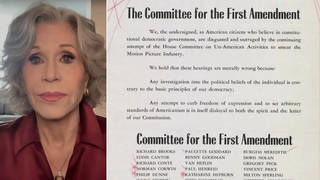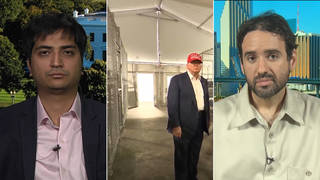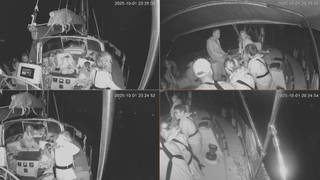
Reverend Billy and the Stop Shopping Gospel Choir went on a holiday circuit to preach against corporate consumer culture from Wal-Mart to Disneyland. The Reverend joins us in our firehouse studio. [includes rush transcript]
We turn now to a crusader against corporate domination. Reverend Billy and the Stop Shopping Gospel Choir have just completed their nationwide tour crossing the country in 2 bio-diesel buses. They urged consumers to celebrate the holidays by rejecting over-consumption, avoiding big-box mega-stores, and supporting local proprietors and community economies. They brought their message to shoppers in a variety of venues including the largest retail complex in the U.S, the Mall of America in Minnesota, the headquarters of Wal-Mart in Bentonville, Arkansas and Disneyland.
During the last several years Reverend Billy and his Church of Stop Shopping have made themselves a thorn in the side of companies like Walt Disney, Nike, Home Depot and Starbucks by staging protests both outside and inside the stores. Today he joins us in the studio.
- Reverend Billy, of the Church of Stop Shopping
- See photos of Reverend Billy and the Stop Shopping Gospel Choir at photographer Fred Askew’s web site.
Transcript
AMY GOODMAN: Today, fresh from a Disney jail, or, well, arrested in Disneyland in California, he’s just back in New York and joins us in our studio. Welcome to Democracy Now!, Reverend Billy.
REVEREND BILLY: Thank you for having me, Sister Amy, on behalf of the Stop Shopping Gospel Church. We’ve been on a mission to save Christmas from the Shopocalypse. We’ve been going across this country asking Americans to count backwards from 10, 9, 8 , 7, 6. Wake up! Are we people, or are we sheeple? We have to stand up to the axis of consumer evil. Amen, Hallelujah! Corporations advertising credit cards.
We’re mistaken to think that we’re consumers at Christmas time. We are being consumed. We’re like geese, Christmas geese, roasted and basted. And here come the Four Supermodels of the Shopocalypse. Children, we must rise to a new level of consciousness and leave the dead exhausted pine tree in our living rooms, march across our front yards and down our streets and out of the supermalls.
I can hear what you’re saying, what you’re thinking: I need that Christmas sale! I need to get that deal, Reverend! I need to buy 13 pair of panty for a dollar. I want to have the gingerbread latte! It’s like Dickens in my tummy! Oh, and I need that new Xbox 360! Oh, the graphics, the special effects! It’s crazy! It’s just like real life!
Children, I think that is the key. The key to walking away from the commercial Christmas is re-founding our real life, discovering what it might be to give a real gift, not a simulated gift, a real gift from the heart. This is Reverend Billy. Sister Amy.
AMY GOODMAN: So, you’ve been preaching across the country?
REVEREND BILLY: Yes, and that was a little excerpt of the — what we call the stump sermon.
AMY GOODMAN: And how were you received, for example, in Bentonville, in the home place of Wal-Mart?
REVEREND BILLY: Wal-Mart. That was very moving. We were just overwhelmed there and quickly abandoned all pretense to shtick. You can just feel the cruelty of that company and its facelessness in Bentonville. Its sign is more modest than your average sign in front of a construction site in New York. It’s just a cheap little plywood sign, not so little, but sort of unmade. And then there’s a parking lot, and there’s — there’s just nothing there. There’s no pretense to architecture at all, no statement to the outside world. And, you know, that’s where Lee Scott pulls down 30 grand a day. We started in a cemetery right around the back and then came around the jail-like exterior, the barbed wire, just praying and singing, and we were just thinking about the thousands upon thousands of people that have been betrayed by that company.
AMY GOODMAN: On the TV broadcast, we’ve been showing photographs, which we’ll put on our website at democracynow.org for our radio listeners, of your Stop Shopping Gospel Choir. They look like angels in white choral gowns as they encircled Wal-Mart?
REVEREND BILLY: Well, it’s hard to encircle Wal-Mart but we circled around the —
AMY GOODMAN: The sign?
REVEREND BILLY: The big sign in front, and while the, you know, corporate rent-a-cops studied us from their SUVs.
AMY GOODMAN: Why’d you go to Disneyland?
REVEREND BILLY: Well, we started the project of Reverend Billy ten years ago in the days of Rudy Giuliani, and the Disney, the new Times Square — do you remember that? — in the late 1990s when the local neighborhood was demonized every day as being made of nothing but muggers and so forth. It was mostly a war on small vendors and independent shops; and here come the clouds of Disney lawyers, settlements, litigiousness, whatever it took, some businesses there 20 or 30 years.
And that’s where we got involved at the beginning. And we discovered the process of not just preaching in front of the Disney store, but then going inside, pretending we were customers; and we started inventing what we call retail interventions. And we did that all across the country. The Stop Shopping Gospel Choir is largely musicians and actors, and we performed as customers all the way across the country.
AMY GOODMAN: What does that mean, “performed as customers”? What’s a “retail intervention”?
REVEREND BILLY: You go in — as we did in Disneyland, you go in as customer. You say, “I’m a willing participant in this product delivery system.” And then later, you begin to have heightened conversations and soap operas and so forth and so on, which deliver information about the corporate behavior of that company.
AMY GOODMAN: You particularly have taken on Starbucks, I remember. In New York, Astor Place, is there, what, six Starbucks in that area?
REVEREND BILLY: It’s a Starbucks cluster right there.
AMY GOODMAN: What do you do?
REVEREND BILLY: Well, Starbucks is an especially egregious company, because they study all social change movements, from the labor movement on, and imitate them. They all become little advertising campaigns —- not so little. They become the subject of the expenditure of hundreds of millions of dollars. In fact, if you just talk to Global Exchange for five minutes you can determine that they are not an environmentally friendly or labor-friendly company. They are employing seven—, eight-, nine-year-old kids out in the pesticide-drenched coffee groves in Guatemala and Chiapas. They have about as much fair trade-certified coffee on their shelves as would be necessary to advertise, about 2% is what Global Exchange and US/LEAP and some of the other monitors in the coffee-growing regions estimate.
AMY GOODMAN: And what would you have them do?
REVEREND BILLY: Well, I’d like to break up the company myself. I think it’s like Standard Oil a hundred years ago. I believe in supporting independent stores. I believe in Main Streets that are healthy and neighborhoods that are healthy, where people are conversing on the stoops and on the street corners. That kind of conversation, that kind of jumpy, sassy direct sort of talk is the kind of thing that makes a political consciousness that becomes — well, we might not be so apt to buy the products of the war in Iraq, for instance, if our Main Streets were not shuttered and killed and then simulated inside supermalls. Basically, all across the country, Mall of America and so forth, we were inside supermalls marching down Main Streets taking back our first amendment rights to shout a little bit and sing a little bit.
AMY GOODMAN: Why were you arrested at Disneyland?
REVEREND BILLY: We were shouting a little bit and singing a little bit. We were — you know, it’s a sweatshop company. It’s one hundred percent sweatshop company. You know Charlie Kernaghan and Barbara Briggs and all the people that know this. And through the changeover from Eisner to Iger, somehow or other the empire of 20,000 sweatshops around the country that bring their products to their shelves, somehow or other, didn’t become an issue. And we remain — somehow or other, Americans remain depoliticized around the act of consuming. They don’t believe that paying for something and taking it off the shelf has any human ramifications.
AMY GOODMAN: We have ten seconds.
REVEREND BILLY: Well, children, consumption can be and is for most of us, here in the shopping season, a sin. Let’s bring some compassionate consciousness to how we make our purchases. Amen, Hallelujah! Merry Christmas.
AMY GOODMAN: Reverend Billy at the end of his Shopocalypse Tour, as he traveled the country with his Choir of Stop Shopping. Thank you for being with us.
REVEREND BILLY: Thank you, Sister Amy.












Media Options